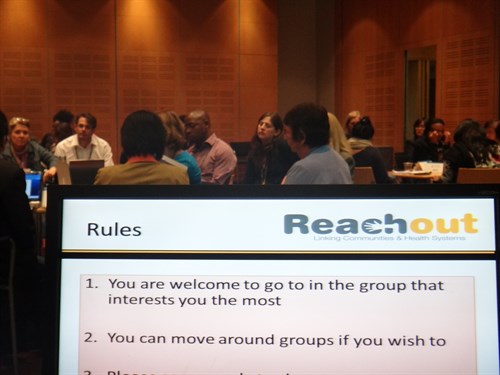
Kate Hawkins, 6 October 2014
REACHOUT was well represented at the Global Symposium on Health Systems Research last week. We hosted panels, gave poster presentations and supported the Thematic Working Group on Supporting and Strengthening the Role of Community Health Workers in Health System Development. There was a real buzz around community health workers (CHWs) and they were featured in the final conference statement.
Panel
Maryse Kok wrote on the KIT website about our session Close-to-community (CTC) providers and health systems: what are the implementation challenges and how can we overcome them? Participants in the session noted:
“ In Thailand, there is much political commitment and the referral system has improved because of this. CTC providers should be recognized at the heart of the health system”.
“We assume that supervision will happen without planning and paying for it. Supervisors have to feel that they are also accountable for the well-being of the clients, it cannot be solely the CTC provider to feel this burden..”
“Coordination is vital, otherwise CTC providers are lost by the number of supervisors, in addition to the high workload they already have. We need leadership.”
You can read more from Maryse here...
Thematic Working Group
We are delighted to be members of the Thematic Working group. Around 40 members gathered together on Tuesday for a meeting of the group. The meeting was introduced by Lilian Otiso and Diana Frymus, the chairs, who explained the background to the group and its aims and objectives. Much of the meeting was taken up with small group work where we discussed the research priorities which we feel the group should pursue and brainstormed potential activities for the next year.
Some of the (very preliminary) headlines are below:
Research:
- Integration and harmonisation. Need better guidance from documenting programmes
- The generation of evidence on scale up. We have evidence at small scale, in particular programmes, on certain health issues under certain circumstances. But how can these programmes be expanded and sustained?
- What is the optimal or absolute workload for CHWs (in terms of patients/households as well as the packages of tasks that they could be expected to take on)?
- Rural and urban challenges
- Supervision, retention, salaries and stipends
- Equity – within the community and in the treatment of CHWs
- What elements of programmes should be monitored and shared?
- Community management systems
- What kind of performance and productivity are we looking at – social investment analysis?
Activities:
- Partnership with CHW Central
- Work with donors so that they can understand the issues and support integration and harmonisation in their funding decisions (possible webinar series)
- Support knowledge transmission from the community itself
- Forge more links with human resources for health initiatives
- Increase membership from low- and middle-income countries
- Explore collaboration with the other TWGs
- Database of who is in the group and their skill sets - so that we can perhaps run a help desk type function
- Each member to identify policy makers in their setting to potentially join the group to diversify the mix
- Partnership with HIFA
- Encourage a CHW stream or involvement at the next Symposium (where are the voices of CHWS?)
- Fact sheets or summaries of information on what is known and unknown on particular themes
To become member of the Thematic Working Group “Supporting and strengthening the role of Community Health Workers in health systems development” , please e-mail:faye.moody@lstmed.ac.uk
Diverse views
It is difficult to do justice to all of the sessions on CHWs at the conference. We have tried to capture some of the Tweets and photos of notable moments in the Storify below.

This project is funded by the European Union.
